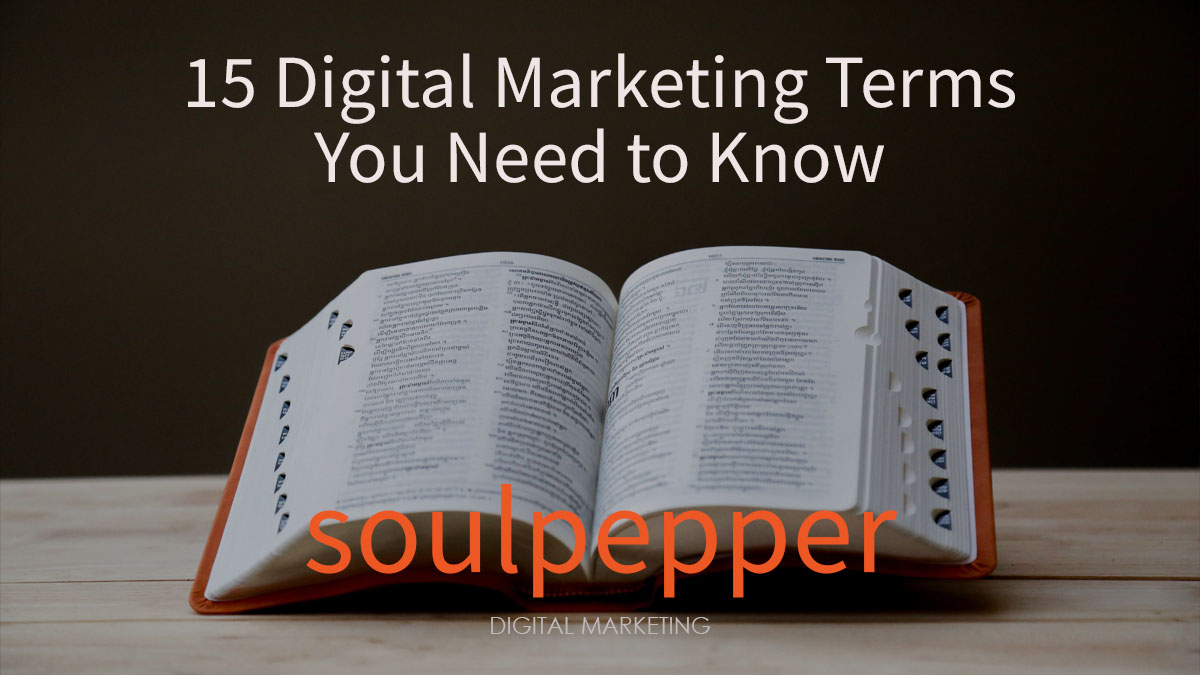Whether you’re just getting into marketing or you want to freshen up your literacy for marketing terms, here are 15 of the most important terms you need to know in the digital marketing world.
1. Cost per Acquisition (CPA)
Also known as cost per action, this metric helps you understand how much it costs you to acquire one customer. By dividing the total cost of your marketing campaign by the number of conversions you received, you can find your CPA. Examples of an acquisition or action could be a sale, click or form submission.
2. Cost per Impression (CPM)
This refers to the cost associated with getting a thousand impressions or views on an advertisement. CPM is calculated by taking the cost of your marketing campaign and dividing it by the number of impressions the campaign got, then multiplying this number by 1000. Impressions help brands build recognition and help you determine how many times your ad appears on a site.

3. Click-Through Rate (CTR)
CTR tells you how many times your ad was clicked on by users. You can find your CTR by taking the total number of clicks your ad received and divide it by the number of impressions. CTR is a common measure of how engaging and relevant your ad copy and imagery is.
4. Engagement Rate
Engagement rate is broader than CTR and tells you how much user interaction your content receives. This might be a click, but for social media ads, it could also be a like, a comment or a share. Usually, a high engagement rate occurs because the content you post is interesting and keeps the user on your page or ad. Engagement rates can be calculated on all social media posts and advertisements.
A|B Testing
This is when you have a couple of similar advertisements running at the same to determine which one performs the best. Using a control ad and a variable ad, you are able to change variants such as your image or copywriting to find which resonates with your target audience more.

6. Remarketing
Have you ever tried to shop for something online, but didn’t end up buying it. Then, next thing you know, you’re seeing ads for the exact same product you shopped for all over your social media? This is known as remarketing and it is done through tracking cookies in your browser. Advertisers use this tactic to remind site visitors of the product/service they were looking at and encourage them to return to the website to purchase/sign up etc.
7. Relevancy Score & Quality Score
On Facebook, it is called a relevancy score and on Google, it is called a quality score. Anytime you advertise on these platforms, they will be comparing your advertisement to similar ads and giving you a grade based on that comparison. A higher relevance or quality score means the more your ads will be shown over your competitors and the less it will cost you to advertise.
8. Call to Action (CTA)
A call to action is trying to prompt the customer to immediately perform an action on your ad or website, whether that be to click, purchase, or opt-in their email. Call to actions can be found on advertisements, email campaigns or on a website.
9. Buyer Persona
This is how you define your target audience. Who are your most ideal customers? The persona should include demographics such as age, gender, income, and interests. You want your buyer persona to be very detailed as if you were describing a real person.

SEO
Search engine optimization (SEO) is the practice of optimizing individual web pages in order to rank higher and earn more relevant traffic in search engines. Some SEO tactics include optimizing your pages with keywords, writing blogs, and acquiring quality backlinks. This just means the quality of your website gets improved and users can more easily find your site. SEO takes time to implement but the long term cost is lower than paying for ads. You can read our Ultimate Guide to SEO here.
Domain Authority
Domain authority is a metric that is a part of SEO. It helps determine whether or not you’ll be able to rank for a keyword. Domain authority numbers are between 1 (worst) and 100 (best). This means that if you have a domain authority of 20 and your competitors have a domain authority of 50, all other things equal, your competitor would be able to rank above you. You can increase your domain authority by using SEO tactics.
Bounce Rate
Bounce rate is calculated based on when a user goes to your website and only views one page before exiting out. Using Google Analytics, you can see your bounce rate. Usually, if this number is high, you should make some improvements to your website to keep users on your website for longer. The more pages a user views, the more time they spend on your site, and the better the rating Google gives your website. Which, in turn, leads to a higher ranking on search engines.
Pay per Click (PPC)
PPC is paying for ads to show up on search engines such as Google. You only need to pay when your ad is clicked on by the user. PPC is great if you want to instantaneously rank on the 1st page of the search engine results page and are happy to pay to get there.
Above the Fold
Above the fold simply means any content that appears on a website before you have to scroll down. It is important to have a succinct and easy to comprehend content above the fold, so when a user loads your website, they immediately understand what is going on and they will stay on your website.
Landing Page
Landing pages are a one-page site that is designed for lead generation. Landing pages contain all the meaningful content that is needed to engage the user and convert them to become leads. Ads that lead to landing pages are statistically proven to able to convert users more readily than ads without landing pages.


